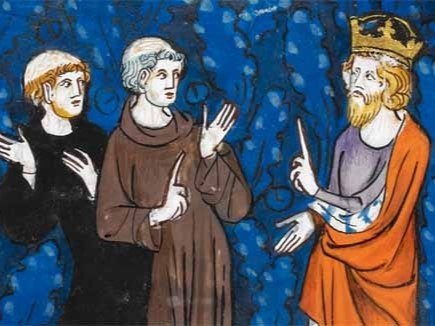Alcuin of York - Talent Gets Poached
Alcuin was the top scholar in the world in his day. He was top talent at the top institution, and he got recruited away by an ambitious leader on the rise.
Alcuin of York (732-804) was a virtuoso from Northumbria. By the mid-700s, the Roman city of Eboracum in northern Britain had transformed into York, the main intellectual center in medieval western Europe, boasting the greatest library in the world, and Alcuin was its premier thinker.
Alcuin had grown up in the cathedral school in York, first as a student, then a teacher, then the master. Alcuin was the greatest mind of his day, but unusually, he was not officially a priest or a monk. He was a gifted teacher, and his students regarded him as a wise mentor and friend.
Alcuin was a people person, with a broad network of friends and penpals all over Europe. He would travel to Europe often on scholarly quests to find the most important books to bring back to the library at York.
In these interactions, he generally made a good impression on his colleagues and made a lot of friends. There is no word in medieval Latin for “back-slapper,” but if there were, it might have been invented for Alcuin.
On one visit in the 770s, he made an important new friend, Charlemagne, king of the Franks. They got along smashingly and kept in touch when Alcuin was back home in York.
In 781, Charlemagne asked him to join the Frankish court at Aachen and take a leading place among the other top scholars of the day. Alcuin accepted and became the head of the palace school, deciding which subjects should be taught and how to instruct the students.
Alcuin thrived at court. Charlemagne was first and foremost a warrior, but he held intellectuals in high esteem. The two men developed a strong bond and productive working relationship. Alcuin was loyal to Charlemagne and knew how to disagree with him respectfully and try to sway his opinion on theological and political manners. Alcuin argued forcefully against Charlemagne’s policy of converting the pagan Saxons to Christianity by the sword.
Alcuin was also tutor to Charlemagne’s sons Pepin and Louis. In a crazy list of questions that the boys asked the master, a sort of early AMA (Ask Me Anything), Alcuin distilled the wisdom of the ancients for the young princes. When one asked “What is death?” Alcuin replied,
“Death is an unavoidable event, an uncertain pilgrimage, the tears of the living, the thief of mankind.”
Whoa, trippy. Alcuin would be the most popular “cool” professor of the freshman seminar class at any university today.
After 15 years at court, Alcuin wanted to take his talents to South Beach and focus on scholarship and teaching instead of courtly duties. In 796, he became the abbot of the monastery of Saint Martin of Tours with Charlemagne’s blessing.
With one of the best retirement packages of the whole medieval era, Alcuin spent the rest of his days surrounded by books and students and learning, dying peacefully in his bed in 804.
Alcuin was very talented, and everyone knew it. So, he got poached. It happened then; it happens now; it’s the way of the world. Alcuin was the leader of the greatest school in the world at York, so when Charlemagne wanted to build the new greatest school in the world, he poached the best talent to make it happen.
Alcuin was a model networker. He got out there in the world, met interesting people, befriended them, and then kept in touch. One of those people was Charlemagne, who rose up in the world, then hired him and became his boss. They had known each other for years before Charlemagne invited Alcuin to court. Business is built on relationships, and relationships take time.
If you’re an Alcuin, someone who is really great at what they do, you gotta get out there in the world and build relationships with folks that can help your talents blossom. If you’re a Charlemagne, a leader trying to build a great team, you know that it all starts with talent, and you gotta attract, grow, and retain the best people.
Eventually, Alcuin felt a calling to move on from the hustle and bustle of the king's court to the quiet solitude of the monastery to focus on the scholarly work that was his calling. Charlemagne didn’t block this move. As much as he liked working with Alcuin, he knew he had to let him go.
So, if you’re planning to build an empire, remember that sometimes you've got to let your star players wander off to the monastery. Nothing lasts forever, so when it’s time for someone to move on, the best leaders let them go with grace, and lean hard on saying “thank you” for all they’ve contributed.





